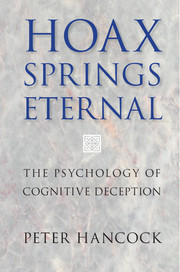Summary - Hoax Springs Eternal
Published online by Cambridge University Press: 05 January 2015
Summary
“Human understanding ... is infused by desire and emotion, which give rise to ‘wishful science.’ For man prefers to believe what he wants to be true. He therefore rejects difficulties, being impatient of enquiry.”
Francis BaconThrough exploring the proposition that Hoax Springs Eternal, I have argued in this book that deception is a fundamental part of life. The various forms deceptions take, each adapt to the organism(s) that practice(s) them. Most animals practice deception in defense of their own continuing existence. In the ongoing battle between predator and prey, the primary expressions of deception are the sensory and perceptual adaptations that look to confuse and fool the senses. Human beings certainly continue to practice these sensory and perceptual deceptions in their various forms, which is perhaps most evident in modern military operations. However, I have argued that humans are different from other animals because they also create and practice cognitive deceptions. As our brains have evolved, and especially as our reliance on our resident cognitive capacities have increased, humans have created an ever-greater capacity for generating differing dimensions of deception. Thus, cognitive deceptions have become progressively more sophisticated and specialized as our social and cultural capabilities have expanded. Humans also practice deception at higher social and political levels, in which certain groups of individuals seek to persuade even larger groups of people about states of the world that are in reality not so. These forms of historical revisionism and propaganda are directed more toward social and political control than any individual profit per se. Although I have not focused on these latter dimensions of deception in this particular work, they certainly share many of the basic psychological dimensions that have been examined and discussed here.
- Type
- Chapter
- Information
- Hoax Springs EternalThe Psychology of Cognitive Deception, pp. 197 - 204Publisher: Cambridge University PressPrint publication year: 2015



